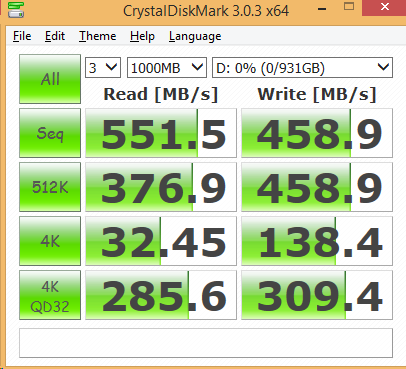CRYSTAL DISK BENCHMARK VER. 3.0 X64
Crystal Disk Benchmark is used to measure read and write performance through sampling of random data which is, for the most part, incompressible. Performance is virtually identical, regardless of data sample so we have included only that using random data samples.
 In Crystal Disk Mark the Boost Pro Micro was able to achieve maximum sequential performance of 552MB/s read and 459MB/s write. We can see that this SSD is very fast when it comes to sequential read performance. On the 4K section we can see a high of 32MB/s for read and 138MB/s for write.
In Crystal Disk Mark the Boost Pro Micro was able to achieve maximum sequential performance of 552MB/s read and 459MB/s write. We can see that this SSD is very fast when it comes to sequential read performance. On the 4K section we can see a high of 32MB/s for read and 138MB/s for write.
The toughest benchmark available for solid state drives is AS SSD as it relies solely on incompressible data samples when testing performance. For the most part, AS SSD tests can be considered the ‘worst case scenario’ in obtaining data transfer speeds and many enthusiasts like AS SSD for their needs. Transfer speeds are displayed on the left with IOPS results on the right.
In AS SSD it hit an overall score of 976. Sequential speeds hit 526MB/s for reads and 435MB/s write. 4K speeds reach 30MB/s for read and 116MB/s for write. Furthermore, the drive reached 69,172 read IOPS and 71,006 write IOPS. Access times are both low at around 0.035ms.
To complement this, the AS SSD Copy Bench presents us with transfer speeds for different file types. The 1TB Boost Pro Micro reached a high of 427MB/s for the ISO test. For its lowest value, it reached 306MB/s on the Program test. Overall, pretty standard performance for an SSD with the SM2246EN at its core.
ANVIL STORAGE UTILITIES PROFESSIONAL
Anvil’s Storage Utilities (ASU) are the most complete test bed available for the solid state drive today. The benchmark displays test results for, not only throughput but also, IOPS and Disk Access Times. Not only does it have a preset SSD benchmark, but also, it has included such things as endurance testing and threaded I/O read, write and mixed tests, all of which are very simple to understand and use in our benchmark testing.
In Anvil Storage Utilities it achieved a total score of 4362, which is certainly respectable. The max sequential read reaches 529MB/s and sequential write comes in at 434MB/s. 4K speeds prove similar to the other benchmarks, 31MB/s for read and 128MB/s for write.
Iometer is an I/O subsystem measurement and characterization tool for single and clustered systems. It was originally developed by the Intel Corporation however, they discontinued work on the program. In 2003 it was re-launched by an international group of individuals who are now continuously improving, porting and extend the product that is now widely used within the industry.
During Iometer testing we were able to easily achieve the rated IOPS for read as well as surpass the rated IOPS for write. Read IOPS at a QD of 32 reached 74,374 and write reached 80,402.
 The SSD Review The Worlds Dedicated SSD Education and Review Resource |
The SSD Review The Worlds Dedicated SSD Education and Review Resource | 

If you’re after 1.8″ drives, it would make more sense (from price perspective) to just buy a msata to 1.8″ sata converter card . You can get them for a few dollars off ebay. Much cheaper than buying 800$+ part.
Otherwise its nice to see more manufacturers going away from sandforce to something more respectable like siliconmotion.
Whether 1TB mSATA product of 2bit MLC is cheaper than this?
In sandforce2281, it is not put out 1TB of capacity.
You have 840evo for 360€ using TLC.
Or if you for some reason cant have TLC (you would _really_ need a good reason not to take TLC) apperently there is a M6PRO msata, thats also 1TB (cant find it on their website, but i see it selling for 600€).
840Evo I will exclude from a short life.
MSATA of M6Pro is suspicious information of 1TB product.
Number basis of memory chips, 1TB in 2bit MLC will feel like difficult.
But if M6Pro mSATA 1TB can buy at 600 euros, I likely can rest assured prefer over there.
>Number basis of memory chips, 1TB in 2bit MLC will feel like difficult.
Its not. 256GB MLC packages (so 4 of them makes 1TB) are not that uncommon. 128Gbit dies and 16 of them in a single package is perfectly achieveable with MLC.
>840Evo I will exclude from a short life.
Where are you getting the idea, that 840evo has short life ?
>Where are you getting the idea, that 840evo has short life ?
I’m sorry.
The life was short, it’s a 840.
Certainly I was life test in the Japanese site.
Like 840Evo is, SMART value becomes trough by writing to 171TB position in 120GB. It’s much longer lasting likely to if 1TB.
At 1TB, you’re likely gonna get 1PB of writes, before you even reach smart at 0%. But even when you do reach 0%, its still gonna work just fine, because its just a predetermined value for segmentation purposes.
And you have to have a really good reason to write soo much data.